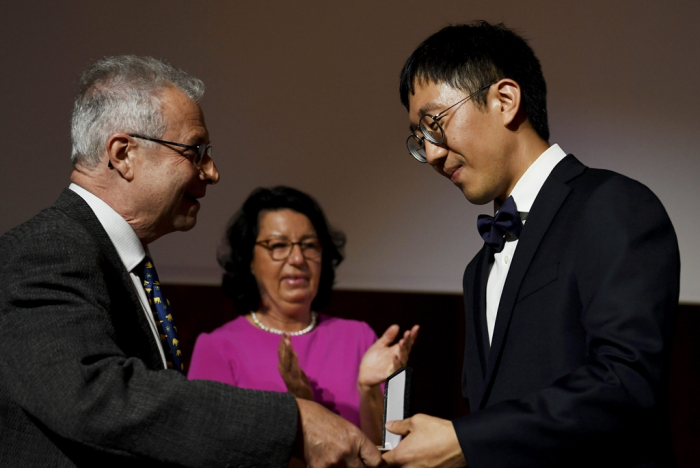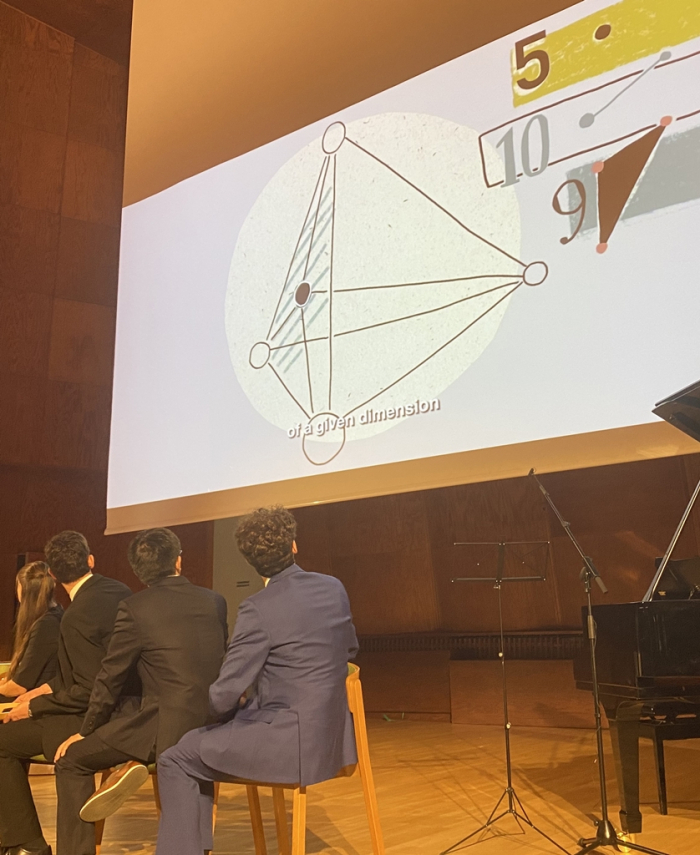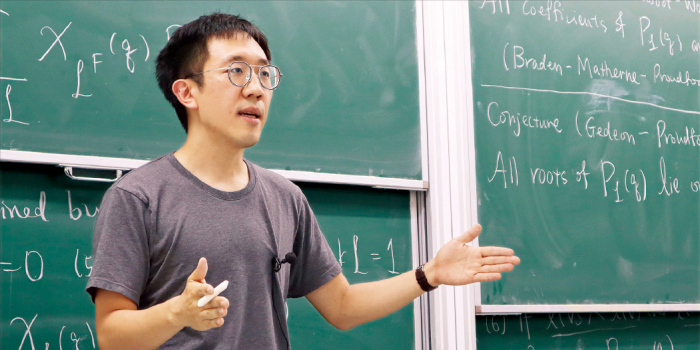Business & Politics
June Huh, mathematician of Korean descent, wins 2022 Fields Medal
Defying the math prodigy stereotype, Huh almost gave up math as a teenager and wasn’t drawn to the field until he was 23
By Jul 05, 2022 (Gmt+09:00)
2
Min read
Most Read
LG Chem to sell water filter business to Glenwood PE for $692 million


KT&G eyes overseas M&A after rejecting activist fund's offer


Kyobo Life poised to buy Japan’s SBI Group-owned savings bank


StockX in merger talks with Naver’s online reseller Kream


Meritz backs half of ex-manager’s $210 mn hedge fund



June Huh, a Korean American mathematician and Princeton University professor, has won this year's Fields Medal, a prestigious prize awarded to young mathematicians for achievements in mathematics.
At a ceremony held in Helsinki on Tuesday, the International Mathematical Union (IMU), which administers the awards, bestowed the medals to four young mathematicians, including Huh.
Huh is the first scholar of Korean descent to win the honor, widely regarded as the Nobel Prize of mathematics.
The Fields Medals are awarded once every four years to some of the most accomplished mathematicians under the age of 40.
The IMU said it chose Huh as a recipient for "bringing the ideas of Hodge theory to combinatorics, the proof of the Dowling–Wilson conjecture for geometric lattices, the proof of the Heron–Rota–Welsh conjecture for matroids, the development of the theory of Lorentzian polynomials and the proof of the strong Mason conjecture."

According to Korea’s science ministry, he has also solved various conjectures, including Read’s conjecture.
As a beginning graduate student at the University of Illinois in 2010, Huh, using combinatorial analysis and algebraic geometry, proved a conjecture in graph theory, known as Read’s conjecture, which had been left open since 1968.
Read’s conjecture concerns polynomials – equations like n4 + 5n3 + 6n2 + 3n + 1 – attached to graphs, which are collections of vertices (points) connected by edges (lines).
Simply put, if you want to color the vertices of a graph so that no two adjacent vertices have the same color, and given a certain number of colors at your disposal, there are many ways to color the graph. It turns out that the total number of possibilities can be calculated using an equation called the chromatic polynomial (which is written in terms of the number of colors being used).
The 39-year-old Korean also serves as a distinguished professor of mathematics at the Korea Institute for Advanced Study (KIAS).
LATE BLOOMER
Huh defies the stereotype of a math prodigy, having not been drawn into the field until he was 23 and in his last year of university. During his middle school and high school days, he almost gave up on mathematics.
The US science magazine Quanta described his Fields Medal win as akin to winning a Wimbledon trophy at the age of 20 after first picking up a tennis racket at 18.

Born in California in 1983 to Korean scholar parents, Huh grew up in Korea after returning to his parents' country at the age of two.
A late bloomer, he told Quanta magazine in a 2017 interview that he didn't think he was good at math growing up. As a teenager, he took to poetry instead, seeing it as a field of creative expression.
Having studied physics and astronomy at Seoul National University, he once considered a career as a science journalist. He received his doctorate in mathematics from the University of Michigan in 2014.
“To me, math is a process of understanding my own biases and limitations. I’m deeply grateful to receive a meaningful award for what I enjoy doing,” Huh said after receiving the Fields Medal.
The Fields Medals, first awarded in 1936, were conceived by John Charles Fields, a Canadian mathematician.
Write to Jin-Won Kim at Jin1@hankyung.com
In-Soo Nam edited this article.
More to Read
-

-
 Travel & LeisureKorean hotels bask in rising foreign visitors; travel agencies in trouble
Travel & LeisureKorean hotels bask in rising foreign visitors; travel agencies in troubleApr 22, 2025 (Gmt+09:00)
-
 Beauty & CosmeticsPackaging rides K-beauty wave: Shares of cosmetics container makers soar
Beauty & CosmeticsPackaging rides K-beauty wave: Shares of cosmetics container makers soarApr 21, 2025 (Gmt+09:00)
-
 Food & BeverageIndia: Tantalizing frontier for K-food’s global ambitions beyond China
Food & BeverageIndia: Tantalizing frontier for K-food’s global ambitions beyond ChinaApr 18, 2025 (Gmt+09:00)
-

Comment 0
LOG IN


